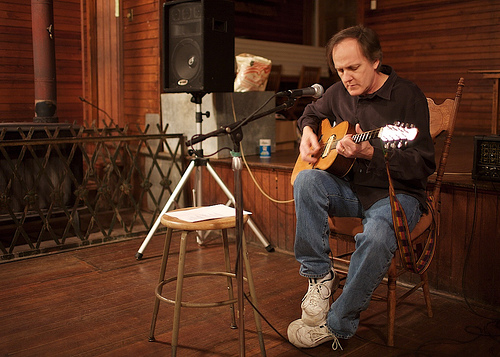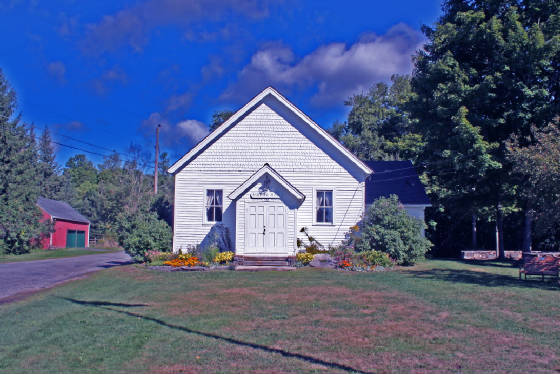
Open Mic In Milltown, a poem by Joe Manning
Main Street,
Friday evening.
I count ninety-six windows
in the tall gray building;
all are dark
except one which reflects the half moon.
Two boys in college windbreakers
hang out by the clothing store.
Several people shiver
outside the ATM.
Three cars are parked carelessly
in front of the art café.
Inside,
standing near the Picasso,
the poet recites to the empty chairs.
The above poem was inspired by an experience I had in North Adams, Massachusetts, in the fall of 1996. I had begun making frequent visits there, and had written a few poems about the city. I showed several of them to a couple of young men who had opened a storefront café on Main Street, which also had an art gallery and performance space in the back.
They invited me to be the featured poet at an open mic session, and I eagerly took them up on it. I made the two-hour drive from my Connecticut home on a Friday night, and was shocked to discover that the only people who showed up were the owners and the mother of one of the owners. With a stiff upper lip, I stood on the makeshift stage and read for about 35 minutes, and even returned for an encore. At least, I got a poem out of it.
About five years ago, I was reminded of this event when I attended a concert at the Iron Horse Music Hall in Northampton, Mass. The performer was David Amram, a name that must have elicited a few comments like, “Who in the hell is that?” I knew very well who he was: a versatile, and award-winning jazz and classical musician and composer, who had written terrific scores for films such as The Manchurian Candidate (1962 version). He also traveled with beat writer Jack Kerouac, providing atmospheric music behind Jack’s recitations.
While waiting outside for the doors to open, I spotted Amram coming toward me. I shook his hand and said, “I’m very excited to see you here. I’ve been a fan of yours for 40 years. One of my favorite film scores is your music for Splendor In The Grass.”
He looked astonished, then smiled and said, “My God, I wrote that in 1961. I’m amazed that anyone remembers it. You just made my day.”
But only seven other people showed up to see him. Despite that, Amram put on a heartfelt and exciting show, which was met with great enthusiasm. During the intermission, he sat and had coffee with members of the audience, dropping by my table for five minutes. I offered up my condolences for the skimpy turnout, but he said it was no big deal. “I’d rather have a few folks who like it, rather than a bunch of bored folks staring into their drinks.”
That’s probably how Bill Lauf feels. Bill and I have been friends for about 20 years. He is my favorite singer-songwriter-performer, and I seldom miss his rare public performances. He lives in northwestern Connecticut. Most of his concerts are held at Milton Hall, a modest, but historic meeting hall in Milton, a tiny village in the town of Litchfield. Bill writes wonderful songs, some achingly beautiful, others screamingly funny, sings them with a perfect balance of emotion and subtlety, and accompanies himself masterfully on guitar, usually the 4-string tenor guitar.
There are few empty chairs at Bill’s Milton Hall shows. His faithful following usually fills all 100 seats. If he does two shows that night, some folks go to both of them. Every time I attend one of his concerts, I drive home convinced that he would fill a million Milton Halls if enough people knew about him.
But, in the music business, it takes a whole lot more than talent to make a living at it, much less become widely known. With a serious day job, and a family to which he is devoted, he has no desire to spend his life contacting unfriendly publishing houses or doing one-night gigs in towns he’s never heard of. So, as he has told me many times, he gets his taste of success by pleasing a devoted audience that is willing and eager to hear his new songs, his old songs, and whatever else he wants to play or sing on any given night.
Early this year, my wife and I drove two hours each way to see Bill at Milton Hall. All of the familiar faces were there, including several fans that travelled a full day and were staying overnight. How many artists can claim that kind of following?
As if on cue, there was a full eclipse of the moon just beginning its own show, and Bill stood and watched with us until it was almost over. Then, in the coziness of this little box of a building that still has a working wood stove, Bill opened with a surprise: a warm and infectious version of Stevie Wonder’s “Love’s In Need of Love Today,” making the song his own. There were the old standbys, like his pastoral “Canadian High” (about a cold front chasing out the summer heat) and his mysterious “Josette” (a dancer), which always turns the audience into backup harmony singers.
And there was “Gray Diner at 5AM,” one of the most evocative of road songs. I had the privilege of hearing him sing it on a front porch in Vermont just after he wrote it. It’s the title of his latest album.
Man in an apron cooking potatoes…strips of bacon on the side,
Smiling waitress comes to help me with her tired, lovin’ eyes.
Shiny stainless…neon sign…remind me of a day gone by.
Steaming coffee in a porcelain cup, rice pudding piled high.
Many years ago, in another Milton concert, Bill introduced his little daughter Lura, and asked her to sing a song. They sat side by side on the edge of the stage, and with Dad’s simple guitar in the background, Lura filled the room with a charming and lovely version of “Somewhere Over the Rainbow.”
Now grown up and married, Lura is a musician and composer. And on this night, she came back to Milton Hall to return the favor. Near the end of the concert, she sat at the piano and accompanied Dad, who sang his classic, and altogether appropriate “Full Moon Through An Apple Tree.” It’s one of the most beautiful songs I’ve ever heard, and this version was special.
Oh, you are a lot like the clouds to me,
Foaming and rolling – so gracefully changing your shape,
While an old wind-sung lullaby
Plays to the stars in the night,
Plays to the stars in the night,
Plays to the stars in the night.
Painter Marc Chagall once said: “The dignity of the artist lies in his duty of keeping awake the sense of wonder in the world.”
So here’s to the artists: the film composer who writes a great score that almost no one remembers, the poet who recites to the empty chairs, and the singer who fills up Milton Hall.

Click below to hear sample of “Full Moon Through An Apple Tree.” The pianist is Kim Oler.
“Full Moon Through An Apple Tree”